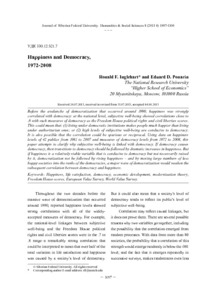Happiness and Democracy, 1972-2008
Скачать файл:
URI (для ссылок/цитирований):
https://elib.sfu-kras.ru/handle/2311/9908Автор:
Inglehart, Ronald F.
Ponarin, Eduard D.
Инглхарт, Р.Ф.
Понарин, Э.Д.
Дата:
2013-08Аннотация:
Before the avalanche of democratization that occurred around 1990, happiness was strongly
correlated with democracy: at the national level, subjective well-being showed correlations close to
.8 with such measures of democracy as the Freedom House political rights and civil liberties scores.
This could mean that: (1) living under democratic institutions makes people much happier than living
under authoritarian ones; or (2) high levels of subjective well-being are conducive to democracy.
It is also possible that the correlation could be spurious or reciprocal. Using data on happiness
levels of 42 publics from 1981 to 2007 and measures of democracy levels from 1972 to 2008, this
paper attempts to clarify why subjective well-being is linked with democracy. If democracy causes
democracy, then transitions to democracy should be followed by dramatic increases in happiness. But
if happiness is a relatively stable variable that is conducive to democracy but not necessarily raised
by it, democratization not be followed by rising happiness – and by moving large numbers of less
happy societies into the ranks of the democracies, a major wave of democratization would weaken the
subsequent correlation between democracy and happiness. Прежде чем пошла лавина демократизации, которая пришлась на период около 1990 года,
счастье строго коррелировалось с демократией: на национальном уровне субъективное
благосостояние показало корреляции близко к 8 с такими мерами демократии, как
политические права, свободы и множество гражданских свобод. Это могло означать, что: (1)
проживание с демократическими институтами делает людей намного более счастливыми,
чем проживание с авторитарными; или (2) высокий уровень субъективного благосостояния
способствует демократии. Также возможно, что корреляция могла быть побочной или
взаимной. При помощи данных об уровнях счастья 42 выборок с 1981 до 2007 гг. и мер уровней
демократии с 1972 до 2008 гг. настоящая статья пытается разъяснить, почему субъективное
благосостояние соединено с демократией. Если демократию вызывает демократия, то
переходы к демократии должны сопровождаться драматическими увеличениями счастья.
Но если счастье относительно устойчивая переменная, которая является способствующей
демократии, но не обязательно повышающаяся ею, демократизация не сопровождается
возрастающим счастьем – и, перемещая большие количества менее счастливых обществ
в разряды демократических государств, главная волна демократизации ослабила бы
последующую корреляцию между демократией и счастьем.

